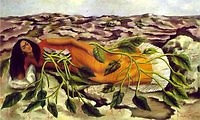“Of course we do. That’s what we are wired to do, it’s our natural state.”
~ Chrysta Coronado, Herbalist
Chrysta Coronado arrives at the local coffee shop slightly frenzied and apologizing for being five minutes late. It seems while cycling over she was nearly run over by a motorist on the all too narrow streets of Grand Rapids. “I was just nearly killed on my bike as I passed a sign that read, 'Bike friendly community,'" she says. “We should bring that up to the local bike council.” This is the embodiment of Chrysta Coronado: when a problem presents itself Chrysta does not leave it for the next person who comes along. She analyzes the problem, presents a solution, and takes action.
Growing up in a suburban nuclear family Chrysta often felt isolated from her surroundings. As she grew older she noticed that it was when she was surrounded by the natural world that she felt connected. The natural world offered her something that was missing in her daily life. As an adult Chrysta began to enter interdependent communities - she has lived in several across the United States and in Mexico - and these experiences led her to begin questioning the structures that shape our perceptions of women, health, and the environment. She began to ask: "How can we change our current social structures so that we can live in agreement within our environment?"
Chrysta, an herbalist who educates the public regarding edible and medicinal indigenous plants, has been active in local community gardens and community life in the Grand Rapids area.
When asked if we have a moral or ethical obligation to protect our planet, Coronado replies “Of course we do. That’s what we are wired to do, it’s our natural state.” From her perspective the fact that we even have to ask this most basic question is absurd. Chrysta credits the question to faulty Western philosophy based on the philosophies of Locke and Hobbes.
Locke theorized that when a person’s possessions are threatened a state of war ensues, thus people are constantly protecting their possessions from the threat of their neighbor's attack. When people feel as though they are under constant threat of attack, they fulfill Hobbes theory of man being solitary and brutish. Chrysta points out that our social structures are built upon the principles of these philosophies, which have caused humans to lose their connections with each other and the environment. Instead of working together within our communities and for our planet, humans often look upon their neighbors and the natural world with suspicion and fear. Chrysta firmly holds that our perceptions of others, the planet, and our material values are part of the social structure that needs to change if we are to save our planet.
She also believes that people have the idea that they are put in the world to survive against the elements. Humans no longer live in harmony with the natural world. Rather, they view the planet as something to battle in the quest for survival. “Humans seek survival through exploitation," she says, and she cites human exploitation as the principle that sets up the question “Do we have a moral and ethical responsibility to preserve a planet in peril?"
From Chrysta’s point of view if we live in synthesis with the earth there will no longer be a question as to what we should do. It is only because of our sense of superiority over, and exploitation of the earth that we find ourselves questioning what we can do to protect the planet. If we live our lives according to natural law we will integrate with the natural world, not battle against it. We will also accept that exploitation and survival are not synonymous concepts.
Chrysta claims we must ask ourselves the question, “Who are we?” She postulates that once this question is asked we will be forced to examine our position in relation to the environment. The recognition that we are not superior to the natural world should stir a collective conscience that directs us to recreate society in order to save our planet in peril.
The Rapidian, a program of the 501(c)3 nonprofit Community Media Center, relies on the community’s support to help cover the cost of training reporters and publishing content.
We need your help.
If each of our readers and content creators who values this community platform help support its creation and maintenance, The Rapidian can continue to educate and facilitate a conversation around issues for years to come.
Please support The Rapidian and make a contribution today.

